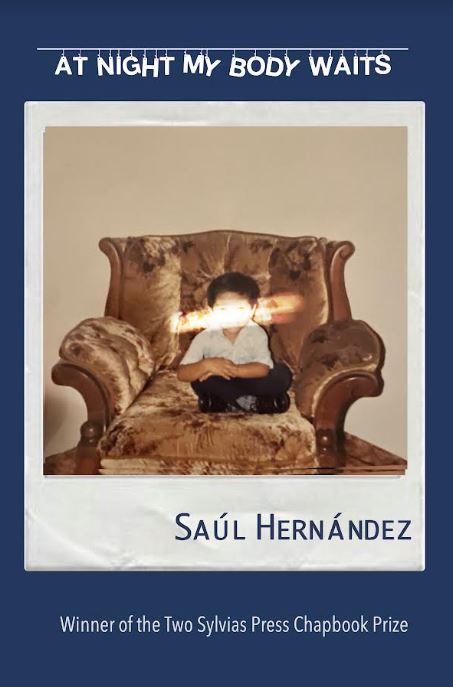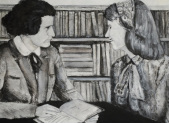Praise for At Night My Body Waits (Winner of the 2021 Two Sylvias Press Chapbook Prize judged by Victoria Chang):
Saúl Hernández's stunning book, At Night My Body Waits, contains multitudes. Hernández explores numerous themes such as grief, immigration, borders, the queer body, sexual abuse, politics, and much more. Put simply, the writing in this book is gorgeous: "Dreams run in my family. In mine I/nail water to the wall, it runs down//my hands and splashes at my feet..." or "I take sleeping pills sometimes,//I become heavy enough to not dream." These poems rely on language to create tension, to express the difficult road of self-acceptance and freedom. This is a coming of age story, of heartbreak, of struggle, of identity, of border, and ultimately of empowerment.
— Victoria Chang, Contest Judge and author of The Trees Witness Everything and Obit
Defiance and vulnerability surge throughout Saúl Hernández’s magnificent poems. The family is both a site of tenderness and abuse. Queerness enlarges and isolates the self. Hernández’s attentiveness to disorienting proximities and to the bitterness of distance infuses his poems with agile and lyrical thinking. Such poems tear open the heart, such poems mend the heart.
— Eduardo C. Corral, author of Guillotine and Slow Lightning
I'm drawn to this poet's endless affection for their grieving mother and the unrequited longing for their father in life and in death. Hernández offers beautifully painful reminders of all the places that grief resides. In his poems, it's small puffs of smoke or a song by the late Vicente Fernández. It's a river, a flood. We are swimming in mourning. The poems themselves are often water soaked dreams or sueñitos. The grief is in the walls at home and in hotel rooms where men steal away and bury their love in one another. It's in the carpets, and it's soaking our shoes. In all the ways that bring solace and injury, in the light and in the dark,
cherish Hernández's ability to render so tenderly the lives of Mexicanos torn
asunder by this life and so many borders. I'm looking forward to reading this poet for many years to come.
— Joseph Rios, author of Shadowboxing: Poems & Impersonations
At Night My Body Waits holds lightning at the tip of its tongue. What is the right move, these poems wonder, between countries of grief; between love and abuse; between dreams and reality? What can be collected between generations in a lightning field? Hernández’s speaker witnesses as well as enacts. They write to retrieve; they write to hold as much lightning as they can stand.
— Yanyi, author of The Year of Blue Water
Saúl Hernández's stunning book, At Night My Body Waits, contains multitudes. Hernández explores numerous themes such as grief, immigration, borders, the queer body, sexual abuse, politics, and much more. Put simply, the writing in this book is gorgeous: "Dreams run in my family. In mine I/nail water to the wall, it runs down//my hands and splashes at my feet..." or "I take sleeping pills sometimes,//I become heavy enough to not dream." These poems rely on language to create tension, to express the difficult road of self-acceptance and freedom. This is a coming of age story, of heartbreak, of struggle, of identity, of border, and ultimately of empowerment.
— Victoria Chang, Contest Judge and author of The Trees Witness Everything and Obit
Defiance and vulnerability surge throughout Saúl Hernández’s magnificent poems. The family is both a site of tenderness and abuse. Queerness enlarges and isolates the self. Hernández’s attentiveness to disorienting proximities and to the bitterness of distance infuses his poems with agile and lyrical thinking. Such poems tear open the heart, such poems mend the heart.
— Eduardo C. Corral, author of Guillotine and Slow Lightning
I'm drawn to this poet's endless affection for their grieving mother and the unrequited longing for their father in life and in death. Hernández offers beautifully painful reminders of all the places that grief resides. In his poems, it's small puffs of smoke or a song by the late Vicente Fernández. It's a river, a flood. We are swimming in mourning. The poems themselves are often water soaked dreams or sueñitos. The grief is in the walls at home and in hotel rooms where men steal away and bury their love in one another. It's in the carpets, and it's soaking our shoes. In all the ways that bring solace and injury, in the light and in the dark,
cherish Hernández's ability to render so tenderly the lives of Mexicanos torn
asunder by this life and so many borders. I'm looking forward to reading this poet for many years to come.
— Joseph Rios, author of Shadowboxing: Poems & Impersonations
At Night My Body Waits holds lightning at the tip of its tongue. What is the right move, these poems wonder, between countries of grief; between love and abuse; between dreams and reality? What can be collected between generations in a lightning field? Hernández’s speaker witnesses as well as enacts. They write to retrieve; they write to hold as much lightning as they can stand.
— Yanyi, author of The Year of Blue Water
Sample Poem:
Amá Sees Fireflies
She stands outside, watches
the roof of the house incinerate
like newspaper caught on fire.
Copper chloride flares flash,
bloom into a blaze. I watch
behind her, the red shimmers remind me
of Abuelo. How he lit a cigarette,
how flames touched the tip, how he
inhaled smoke, let out fire. Isn’t it beautiful,
she says. The firestorm brews and
she laughs at sounds of sirens.
The roof of our house collapses,
sparks flutter into the air.
She laughs harder, speckles
of ash fall on us. She twirls,
spirals of fire. People watch her--
Amá the firework show.
She keeps on repeating, Ya soy libre.
Ya soy libre. Ya soy libre, papá— libre.
She turns, grabs my hands, tells me: dance
with me. We spin in circles, our burning
house blurs into a field of hibiscus flowers.
Amá lets go of my hands. I catch my balance.
Flakes of debris come down, she tells me to
make a wish on one of the fireflies.
I close my eyes, Amá sings the song she
played in the house the day her father died:
Y volver volver, volver a tus brazos
otra vez. The smell of soot and
sway of fumes remind me of him--
Amá Sees Fireflies
She stands outside, watches
the roof of the house incinerate
like newspaper caught on fire.
Copper chloride flares flash,
bloom into a blaze. I watch
behind her, the red shimmers remind me
of Abuelo. How he lit a cigarette,
how flames touched the tip, how he
inhaled smoke, let out fire. Isn’t it beautiful,
she says. The firestorm brews and
she laughs at sounds of sirens.
The roof of our house collapses,
sparks flutter into the air.
She laughs harder, speckles
of ash fall on us. She twirls,
spirals of fire. People watch her--
Amá the firework show.
She keeps on repeating, Ya soy libre.
Ya soy libre. Ya soy libre, papá— libre.
She turns, grabs my hands, tells me: dance
with me. We spin in circles, our burning
house blurs into a field of hibiscus flowers.
Amá lets go of my hands. I catch my balance.
Flakes of debris come down, she tells me to
make a wish on one of the fireflies.
I close my eyes, Amá sings the song she
played in the house the day her father died:
Y volver volver, volver a tus brazos
otra vez. The smell of soot and
sway of fumes remind me of him--


